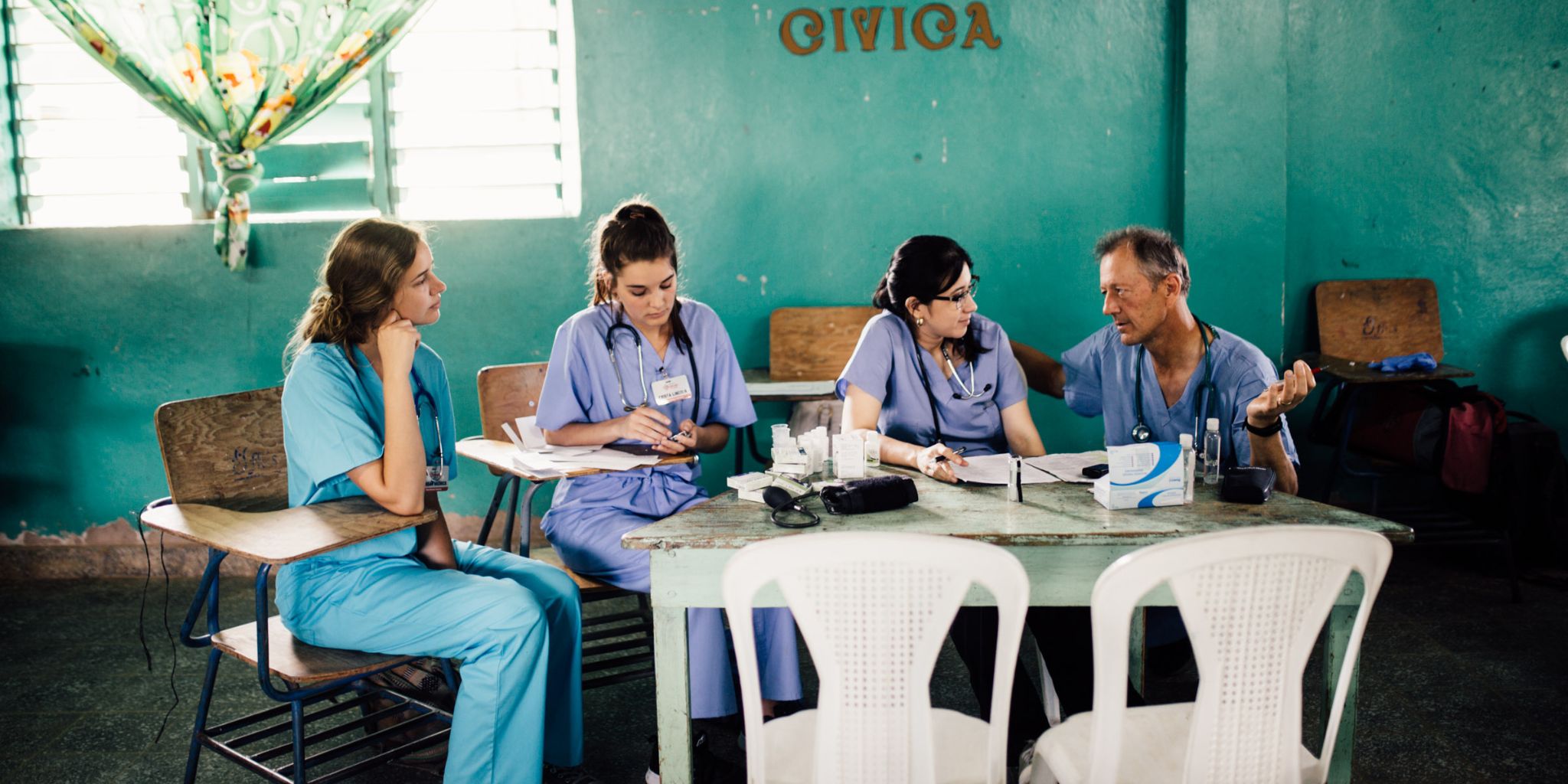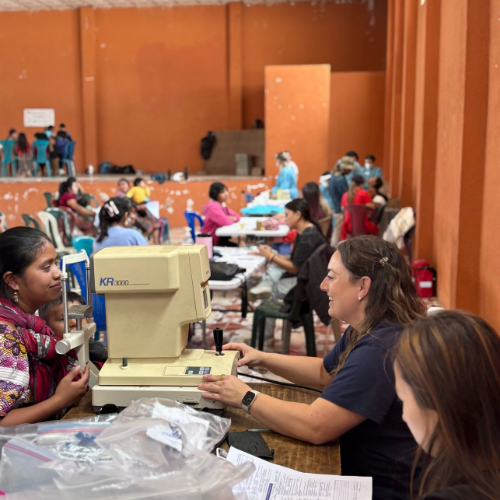Medical mission trips for pre-med students can offer several benefits, from broadening your personal mindset to improving your medical school application and resume.
However, the idea of “mission trips” is one that’s become tarnished by a combination of white saviorism and unethical volunteering practices. In fact, that’s why we don’t use the term at all — instead, we send students on brigades to support ongoing in-country efforts in the 5 global communities we serve.
If you’re a pre-med student looking to volunteer abroad, there are a few major benefits and drawbacks to consider before selecting an organization to partner with. Let’s take a look!
Learn about how we’re the largest student-led movement for global health.
Benefits of Volunteering Abroad for Pre-Meds
Volunteering abroad offers several potential benefits for pre-med students looking to develop their skills and understanding of healthcare systems. These experiences can:
- Offer transformative moments
- Provide new perspectives
- Help foster a more global mindset toward healthcare
From hands-on clinical experience led by licensed professionals and personal growth to developing new skills and developing a global healthcare mindset, we discuss the benefits of volunteering abroad on ethical medical mission trips.
1. Hands-On Clinical Experience
A key benefit of medical volunteer work in developing countries is the unique, hands-on clinical experience it offers..
Pre-med students can gain exposure to an immersive patient care experience, taking patient vitals, recording patient histories, and shadowing medical professionals. While students may have similar opportunities at home, international medical volunteering often allows for more immersion in the process and a new perspective with a population different from residents of a student’s home country.
This close-up view of patient care can be a valuable asset when applying to medical school, as it showcases a practical understanding of the medical field beyond theoretical knowledge.
2. New Skills
Additionally, ethically developed medical brigades can push pre-med students out of their comfort zone.
Living and working in places like Ghana, Honduras, Panama, Guatemala, or Greece requires adaptability and resilience, skills highly valued in healthcare professionals.
You may also find yourself learning a foreign language like Spanish, providing a much-needed skill for future work with diverse patient populations.
What is the best volunteering for pre-med students? The best volunteer opportunities for pre-med students are ethical medical volunteer abroad programs hosted by organizations with ongoing in-country efforts and staff.
3. A Global Health Mindset
Working in healthcare systems vastly different from those in developed nations helps students appreciate the challenges of public health in these contexts.
Whether it's grappling with HIV/AIDS in South Africa or helping improve pediatric care in Nepal, these experiences can deepen your understanding of global health disparities.
These experiences can foster a sense of compassion, sympathy, and selflessness. Working with underprivileged communities in countries such as Guatemala or Ghana can make the abstract concept of health inequity a tangible reality.
This can spark a lifelong commitment to equity in healthcare, an important quality for future healthcare providers.
Volunteering abroad also provides an opportunity to learn from and work alongside local doctors and healthcare professionals. This cross-cultural interaction can provide valuable insights into different approaches to healthcare and an understanding of how cultural, social, and economic factors impact health outcomes.
4. Personal Growth and Experiences
Volunteering abroad is not just about the medical experience; it's about personal growth and expanding horizons. It's a chance to create lasting relationships with peers at your university and people around the world, explore fascinating countries, and affirm or refine your reasons for wanting to pursue a medical career.
While you gain clinical experience, you'll also build a network of international healthcare professionals, make friends from around the world, and get a broader worldview.
The medical skills and knowledge gained are invaluable. Still, the biggest takeaway for many pre-med students who volunteer abroad is the understanding and appreciation of the broader context of healthcare, and the role they can play as future medical professionals to address health disparities.
Brigades can indeed be life-changing and affirming experiences, paving the way for a meaningful career in the medical field. Plus, they offer a fascinating and comprehensive volunteer project to discuss in your personal statement and medical school interviews.
Cons of Medical Mission Trips
While medical mission trips present a range of valuable opportunities for pre-med students, it's essential to acknowledge the potential downsides.
Critiques of such trips typically revolve around ethical considerations, impact on local communities, and the potential for inadvertent harm if not handled correctly.
1. White Saviorism
One of the significant cons is the risk of perpetuating the "white savior" complex. This is true if the intention behind the trip (even unstated) is more about personal satisfaction or appearing altruistic rather than genuinely helping the communities in need.
This behavior can breed dependence, disrupt local healthcare systems, and inadvertently undermine the dignity and autonomy of local communities in developing countries.
The issue of short-term missions can also contribute to this problem. Brief stints in a country may not allow for adequate understanding and appreciation of the local culture and health challenges. This lack of context can lead to solutions that are not sustainable or relevant to the community's specific needs.
Additionally, it may create a cyclic dependency where local healthcare systems rely on temporary aid rather than developing sustainable improvements.
2. Mismatched Skill vs. Need
There's also a potential issue of volunteer skill level and competence pairing well with needs on the ground.
Pre-med students, while enthusiastic and well-intentioned, are not fully trained medical professionals. They may lack the expertise and licensing necessary to provide effective medical care, which can be harmful to patients and can exacerbate the issue of trust between healthcare providers and the community.
That’s why Global Brigades develops large teams of self-sustaining staff in-country to take the lead on all medical care. When medical, dental, or nursing students go on a brigade, they support well-trained doctors, nurses, and other healthcare professionals who provide comprehensive patient care.
3. Language Barriers
There can be significant language barriers where most citizens don’t speak English. This can lead to misunderstandings, misdiagnoses, and potential harm to patients, emphasizing the importance of cultural competence in healthcare delivery.
Global Brigades partners with trained interpreters and translation services for students shadowing doctors to understand patient consultations and interactions.
4. High Cost
Lastly, the cost of these trips can be prohibitive for many students. Travel to far-off places, coupled with program fees and personal expenses, can make such opportunities inaccessible to many who would otherwise be interested.
While the intent of medical mission trips is generally to provide care to underserved populations, trips must be planned and implemented with care and consideration to avoid these potential negatives.
Organizations and volunteers alike have to approach these opportunities with humility, a willingness to learn, and a dedication to sustainable and ethical practices. It’s the only way that the benefits to both the volunteers and the communities they serve far outweigh the potential downsides.
Global Medical Brigades offers students the chance to do TeleBrigades, virtually shadowing professionals in a mobile medical clinic. This allows for a much lower-cost way for pre-med students to gain valuable volunteer experience and exposure to real-life clinical interactions.
How To Choose a Pre-Med Volunteering Abroad Opportunity
Selecting a pre-med volunteering abroad opportunity involves thoughtful research and consideration. Here are a few tips that can guide your decision:
- Identify your motivations: Reflect on your reasons for wanting to volunteer. Is it to gain clinical experience? Broaden your cultural horizons? Learn about healthcare systems in developing countries? Or perhaps you're driven by the desire to make a difference.
- Examine the organization's goals and values: Look for volunteer programs that prioritize ethical and sustainable practices, invest in local communities, and respect local healthcare professionals. They should be dedicated to long-term solutions and not merely temporary interventions.
- Evaluate the organization's support and training: Quality organizations will offer pre-departure training and on-the-ground support to volunteers. They should also provide education on local culture and language to enhance communication and mutual understanding.
- Consider the skills you'll acquire: Will you get hands-on clinical experience? Will you have the opportunity to shadow local doctors? Will you gain insight into the public health challenges facing the community?
- Reflect on the sustainability of the project: Does the organization work with local healthcare providers to ensure continuity of care? Is there a plan for sustainable health development, beyond short-term volunteer visits?
In your search, consider partnering with Global Medical Brigades, the largest student-led movement for global health. GMB offers medical volunteer opportunities designed to bring healthcare to under-resourced communities abroad while providing pre-med students with the chance to gain substantial healthcare experience.
Global Medical Brigades: International Volunteer Opportunities in 5 Countries
College students preparing for a medical career can begin or join a university Global Brigades chapter to join ongoing medical volunteer work in one of our 5 partner countries:
As a healthcare volunteer with GMB, you'll have the opportunity to shadow local doctors during patient consultations, support medicine distribution within the pharmacy, and lead health education workshops. This hands-on experience in a medical clinic setting can enhance your medical career prospects.
Plus, our holistic model ensures a sustainable impact on health by addressing health determinants such as public health, Water, Sanitation, and Hygiene (WASH), and economic access. You'll learn about these crucial aspects of global health while also supporting the implementation of a water system and public health infrastructure.
Another way to get involved with GMB is by becoming a chapter leader at your university. As a chapter leader, you'll play an instrumental role in recruiting volunteers, fundraising, and organizing brigade trips, providing a valuable leadership experience.
By joining Global Medical Brigades, you'll be stepping outside your comfort zone, immersing yourself in a new culture, and playing an active role in improving healthcare systems in underprivileged communities.
It's an opportunity to become a global citizen and contribute to sustainable change in global health.
Partner with the work being done on the ground — join a brigade!




.png)
